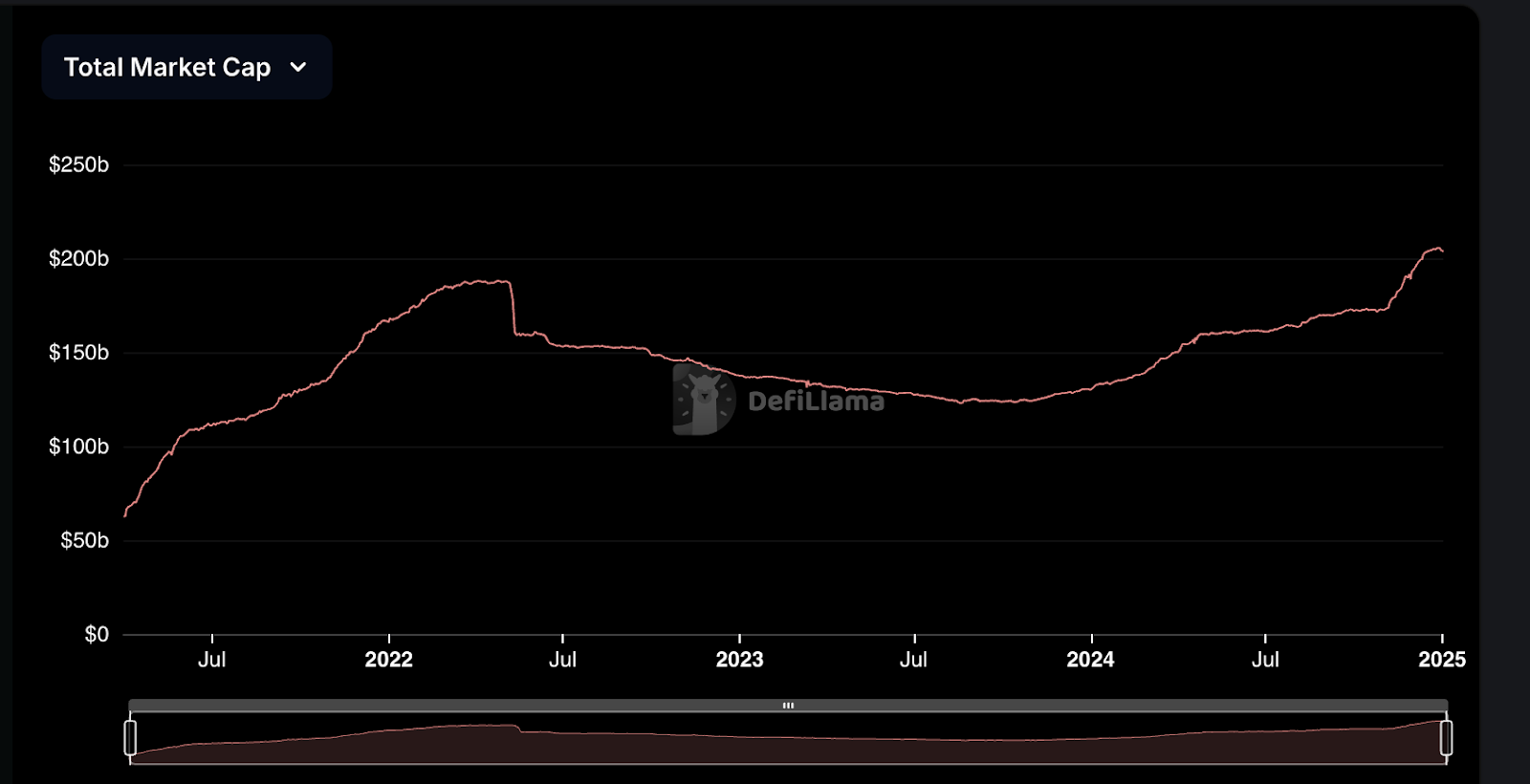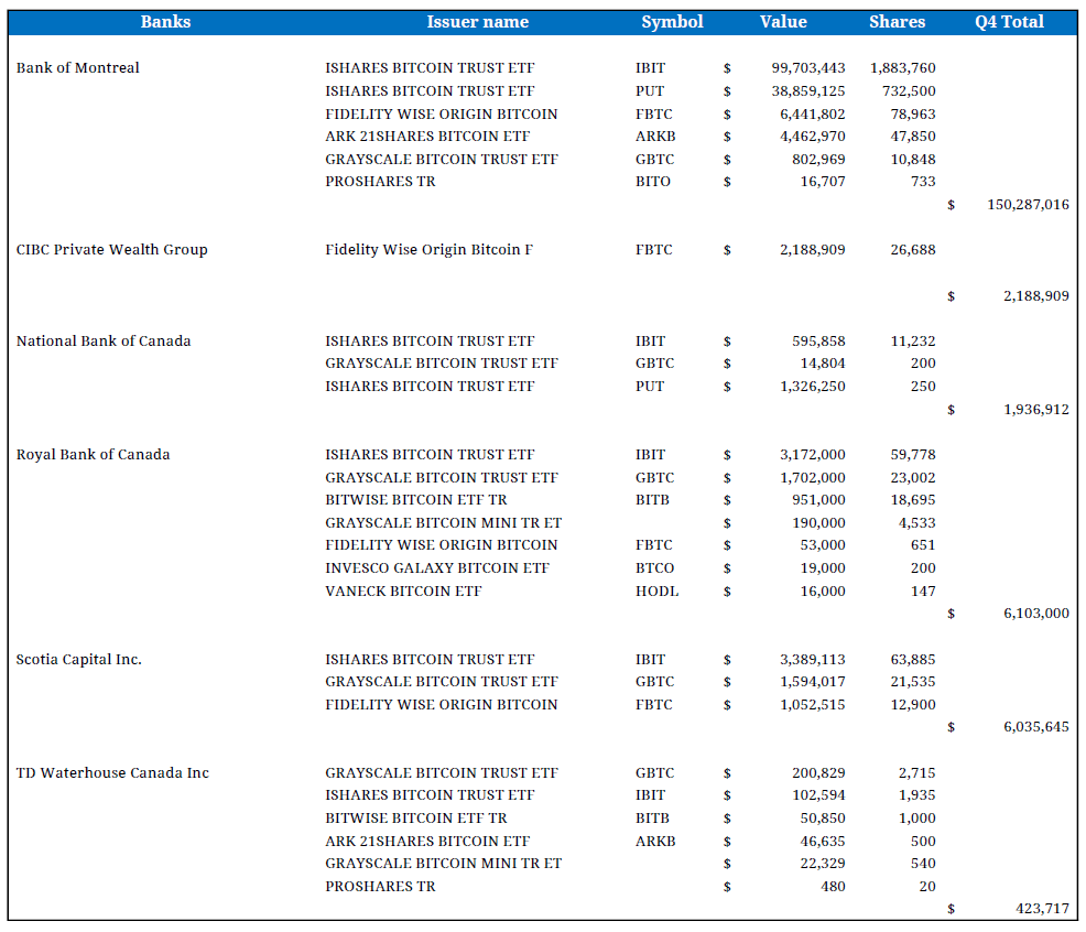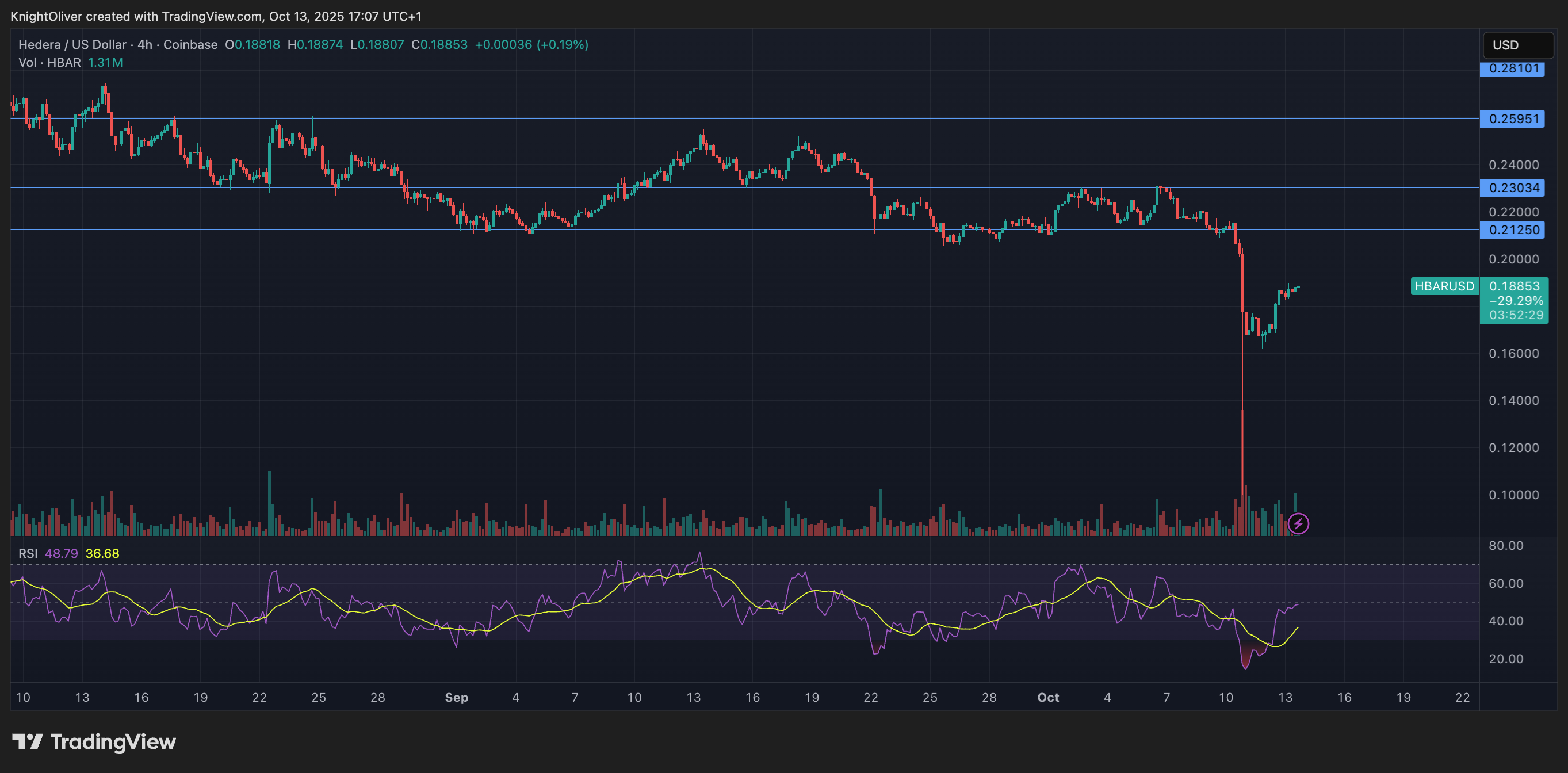Uncategorized
Crypto for Advisors: DeFi and On-chain Finance

Recent security breaches have rocked the crypto space, highlighting the fact that security will continue to need to be a key focus for providers.
In today’s issue, Marcin Kaźmierczak from Redstone Oracles breaks down why 2025 will be a critical year for DeFi and on-chain finance.
Then, Kevin Tam looks at the institutional adoption of bitcoin as seen from the recent 13-F filings and highlights key positions in Ask and Expert.
You’re reading Crypto for Advisors, CoinDesk’s weekly newsletter that unpacks digital assets for financial advisors. Subscribe here to get it every Thursday.
DeFi Renaissance — Why 2025 Will Be The Year of Decentralized And On-Chain Finance?
The recent hack of ByBit for nearly 401.000 ETH, valued at about $1.5 billion at that time, exposed that security will play a tremendous role in further crypto adoption. Can institutions expand on-chain after such an incident? Undoubtedly. It’s a matter of gradual adoption alongside ensuring top-notch security procedures.
Growing Adoption of Yield-Bearing Assets: Staking, Liquid Staking, Restaking and Liquid Restaking
In traditional finance, yield-generating assets are typically seen as stronger long-term investments than non-productive ones since they provide investors with ongoing cash flow and income. This perspective helps explain why some investors prefer ether over bitcoin. Ether is seen as more “productive” because it powers a network supporting a wide range of decentralized applications, benefiting from network effects. Beyond that, ether can be staked to earn consistent yield, aligning well with traditional valuation methods that prioritize ongoing dividends. The rising interest in staking, especially in the context of yield-generating assets, is evident in the growth of liquid staking, which enables frictionless and capital-efficient staking. This trend accelerated further in 2024 with the emergence of liquid restaking — for instance, ether.fi, a leading liquid restaking platform, saw explosive growth last year, with over $8 billion worth of ether staked through its rails.

Source: DeFi Llama, Total Value Locked in Ether.Fi
The total amount of staked ether is expected to grow and play a significant role in DeFi. Around one-third of all ETH — or $90 billion — is staked, with further inflows anticipated from traditional financial institutions exploring staking. As staking becomes more accessible through FinTech applications, some investors may transition from custodial to non-custodial solutions as they gain a deeper understanding of blockchain technology.
Stablecoin Growth
Global demand for U.S. dollar exposure is immense, and stablecoins are the most efficient way to meet it. Stablecoins like USDC expand access to dollar-denominated wealth preservation and streamline value exchange. In 2024, venture capital investments have flowed into stablecoin projects, and we anticipate further development in this space. Regulatory frameworks like the EU’s MiCA have provided more explicit guidelines, further legitimizing stablecoins and likely driving higher adoption next year. Additionally, stablecoins are being integrated into traditional financial systems. For example, Visa has begun using USDC on networks like Solana to facilitate faster and more efficient payments. Additionally, PayPal entered the market with PUSD, and Stripe made one of crypto’s most significant acquisitions by purchasing Bridge to expand its stablecoin operations. In 2024, the total stablecoin market capitalization reached an all-time high, exceeding $200 billion dollars, and continuing to set new records in 2025.

Source: DeFi Llama, Total Stablecoins Market Cap
Enhanced Interoperability and User-Friendly Non-Custodial Solutions
A key challenge in DeFi is moving funds across networks to access different investments. By 2025, significant progress is anticipated toward eliminating the necessity of bridging funds by introducing a «one-click solution.» This development should simplify the process for new DeFi users, likely attracting more participants to the space. Additionally, wallet providers are expected to improve the security of on-chain finance and streamline the onboarding process by eliminating cumbersome crypto-native setups. This shift, driven by innovations like the Account Abstraction movement, aims to make crypto more accessible and user-friendly for accessing on-chain finance. Currently, the irreversible nature of transactions and the prevalence of sophisticated scams deter many new users. However, improved security features should encourage more individuals to engage with decentralized finance.
Bitcoin Reaching $100K
While simply holding bitcoin on its native network isn’t inherently linked to on-chain finance, we’re witnessing a growing integration of bitcoin with decentralized financial ecosystems. For example, roughly 0.5% of bitcoin’s total supply through staking protocol Babylon is now locked to secure Proof-of-Stake (POS) chains. The increased acceptance of bitcoin by large banks and some governments is anticipated to create trickle-down effects, changing the public’s perception of digital currencies away from being seen purely as a speculative asset or illicit activities toward being a legitimate financial instrument, bringing new users on-chain.
—Marcin Kaźmierczak, COO, Redstone Oracles
Ask an Expert
Q: Can banks hold crypto with SEC’s SAB 122?
A: SEC’s Staff Accounting Bulletin 122 may encourage banks to integrate digital assets into the regulated financial system. By opening competition, banks can compete with centralized exchanges. Banks can offer services like bitcoin-backed lending, staking and custodial services, which treat digital assets more like traditional assets.
This is a positive move into a more flexible regulatory approach and balancing investor protections with the operational realities of financial institutions.
From institutional investment to mainstream recognition, this is another major shift in how the world views and interacts with digital assets.
Q: Which Institutions (e.g. sovereign wealth funds, pensions, companies, etc.) are buying bitcoin?
A: The accumulation by sovereign wealth funds, and pension funds is just getting started.
Mubadala Investment Company PJSC (the wealth fund owned by the government of Abu Dhabi) holds $436 million in one bitcoin ETF with overall assets under management of $302 billion. Abu Dhabi’s sovereign wealth fund (AIDA) manages a combined $1.7 trillion, indicating that their bitcoin investment is a relatively small portion of the overall portfolio.
Additionally, this past fall, Mubadala offered to acquire Canadian asset management firm CI Financial Corp. for $4.6 billion.
In the U.S., the State of Wisconsin Investment Board’s latest report shows its bitcoin ETF holdings have more than doubled from last quarter to over $321 million.

Q: Banking on bitcoin – Which Canadian bank is leading the charge?
A: Recent Q4 2024 SEC filings reveal that Canadian Schedule 1 banks, institutional money managers, pension funds and sovereign wealth funds have disclosed significant bitcoin holdings (see charts).
Notably, Bank of Montreal now tops Canadian banks with $139 million in spot bitcoin ETF investments. And BMO’s bitcoin holdings went from zero to over $100 million in a single year.

Currently, in North America, there are approximately 1,623 large entities holding over $25.8 billion in bitcoin ETPs.
—Kevin Tam, digital asset research specialist
Keep Reading
Citadel announced plans to offer crypto trading and liquidity.
Curious about the Bybit hack? Stephen Sargeant created a LinkedIn post summarizing some of the recovery efforts that are underway with the support of the crypto community.
Coinbase announced last week that the SEC would be dropping its lawsuit against the exchange.
Business
Strategy Bought $27M in Bitcoin at $123K Before Crypto Crash

Strategy (MSTR), the world’s largest corporate owner of bitcoin (BTC), appeared to miss out on capitalizing on last week’s market rout to purchase the dip in prices.
According to Monday’s press release, the firm bought 220 BTC at an average price of $123,561. The company used the proceeds of selling its various preferred stocks (STRF, STRK, STRD), raising $27.3 million.
That purchase price was well above the prices the largest crypto changed hands in the second half of the week. Bitcoin nosedived from above $123,000 on Thursday to as low as $103,000 on late Friday during one, if not the worst crypto flash crash on record, liquidating over $19 billion in leveraged positions.
That move occurred as Trump said to impose a 100% increase in tariffs against Chinese goods as a retaliation for tightening rare earth metal exports, reigniting fears of a trade war between the two world powers.
At its lowest point on Friday, BTC traded nearly 16% lower than the average of Strategy’s recent purchase price. Even during the swift rebound over the weekend, the firm could have bought tokens between $110,000 and $115,000, at a 7%-10% discount compared to what it paid for.
With the latest purchase, the firm brought its total holdings to 640,250 BTC, at an average acquisition price of $73,000 since starting its bitcoin treasury plan in 2020.
MSTR, the firm’s common stock, was up 2.5% on Monday.
Business
HBAR Rises Past Key Resistance After Explosive Decline

HBAR (Hedera Hashgraph) experienced pronounced volatility in the final hour of trading on Oct. 13, soaring from $0.187 to a peak of $0.191—a 2.14% intraday gain—before consolidating around $0.190.
The move was driven by a dramatic surge in trading activity, with a standout 15.65 million tokens exchanged at 13:31, signaling strong institutional participation. This decisive volume breakout propelled the asset beyond its prior resistance range of $0.190–$0.191, establishing a new technical footing amid bullish momentum.
The surge capped a broader 23-hour rally from Oct. 12 to 13, during which HBAR advanced roughly 9% within a $0.17–$0.19 bandwidth. This sustained upward trajectory was characterized by consistent volume inflows and a firm recovery from earlier lows near $0.17, underscoring robust market conviction. The asset’s ability to preserve support above $0.18 throughout the period reinforced confidence among traders eyeing continued bullish action.
Strong institutional engagement was evident as consecutive high-volume intervals extended through the breakout window, suggesting renewed accumulation and positioning for potential continuation. HBAR’s price structure now shows resilient support around $0.189–$0.190, signaling the possibility of further upside if momentum persists and broader market conditions remain favorable.

Technical Indicators Highlight Bullish Sentiment
- HBAR operated within a $0.017 bandwidth (9%) spanning $0.174 and $0.191 throughout the previous 23-hour period from 12 October 15:00 to 13 October 14:00.
- Substantial volume surges reaching 179.54 million and 182.77 million during 11:00 and 13:00 sessions on 13 October validated positive market sentiment.
- Critical resistance materialized at $0.190-$0.191 thresholds where price movements encountered persistent selling activity.
- The $0.183-$0.184 territory established dependable support through volume-supported bounces.
- Extraordinary volume explosion at 13:31 registering 15.65 million units signaled decisive breakout event.
- High-volume intervals surpassing 10 million units through 13:35 substantiated significant institutional engagement.
- Asset preserved support above $0.189 despite moderate profit-taking activity.
Disclaimer: Parts of this article were generated with the assistance from AI tools and reviewed by our editorial team to ensure accuracy and adherence to our standards. For more information, see CoinDesk’s full AI Policy.
Business
Crypto Markets Today: Bitcoin and Altcoins Recover After $500B Crash

The crypto market staged a recovery on Monday following the weekend’s $500 billion bloodbath that resulted in a $10 billion drop in open interest.
Bitcoin (BTC) rose by 1.4% while ether (ETH) outperformed with a 2.5% gain. Synthetix (SNX, meanwhile, stole the show with a 120% rally as traders anticipate «perpetual wars» between the decentralized trading venue and HyperLiquid.
Plasma (XPL) and aster (ASTER) both failed to benefit from Monday’s recovery, losing 4.2% and 2.5% respectively.
Derivatives Positioning
- The BTC futures market has stabilized after a volatile period. Open interest, which had dropped from $33 billion to $23 billion over the weekend, has now settled at around $26 billion. Similarly, the 3-month annualized basis has rebounded to the 6-7% range, after dipping to 4-5% over the weekend, indicating that the bullish sentiment has largely returned. However, funding rates remain a key area of divergence; while Bybit and Hyperliquid have settled around 10%, Binance’s rate is negative.
- The BTC options market is showing a renewed bullish lean. The 24-hour Put/Call Volume has shifted to be more in favor of calls, now at over 56%. Additionally, the 1-week 25 Delta Skew has risen to 2.5% after a period of flatness.
- These metrics indicate a market with increasing demand for bullish exposure and upside protection, reflecting a shift away from the recent «cautious neutrality.»
- Coinglass data shows $620 million in 24 hour liquidations, with a 34-66 split between longs and shorts. ETH ($218 million), BTC ($124 million) and SOL ($43 million) were the leaders in terms of notional liquidations. Binance liquidation heatmap indicates $116,620 as a core liquidation level to monitor, in case of a price rise.
Token Talk
By Oliver Knight
- The crypto market kicked off Monday with a rebound in the wake of a sharp weekend leverage flush. According to data from CoinMarketCap, the total crypto market cap climbed roughly 5.7% in the past 24 hours, with volume jumping about 26.8%, suggesting those liquidated at the weekend are repurchasing their positions.
- A total of $19 billion worth of derivatives positions were wiped out over the weekend with the vast majority being attributed to those holding long positions, in the past 24 hours, however, $626 billion was liquidated with $420 billion of that being on the short side, demonstrating a reversal in sentiment, according to CoinGlass.
- The recovery has been tentative so far; the dominance of Bitcoin remains elevated at about 58.45%, down modestly from recent highs, which implies altcoins may still lag as capital piles back into safer large-cap names.
- The big winner of Monday’s recovery was synthetix (SNX), which rose by more than 120% ahead of a crypto trading competition that will see it potentially start up «perpetual wars» with HyperLiquid.
-

 Business12 месяцев ago
Business12 месяцев ago3 Ways to make your business presentation more relatable
-

 Fashion12 месяцев ago
Fashion12 месяцев agoAccording to Dior Couture, this taboo fashion accessory is back
-

 Entertainment12 месяцев ago
Entertainment12 месяцев ago10 Artists who retired from music and made a comeback
-

 Entertainment12 месяцев ago
Entertainment12 месяцев ago\’Better Call Saul\’ has been renewed for a fourth season
-

 Entertainment12 месяцев ago
Entertainment12 месяцев agoNew Season 8 Walking Dead trailer flashes forward in time
-

 Uncategorized4 месяца ago
Uncategorized4 месяца agoRobinhood Launches Micro Bitcoin, Solana and XRP Futures Contracts
-

 Business12 месяцев ago
Business12 месяцев ago15 Habits that could be hurting your business relationships
-

 Entertainment12 месяцев ago
Entertainment12 месяцев agoMeet Superman\’s grandfather in new trailer for Krypton





